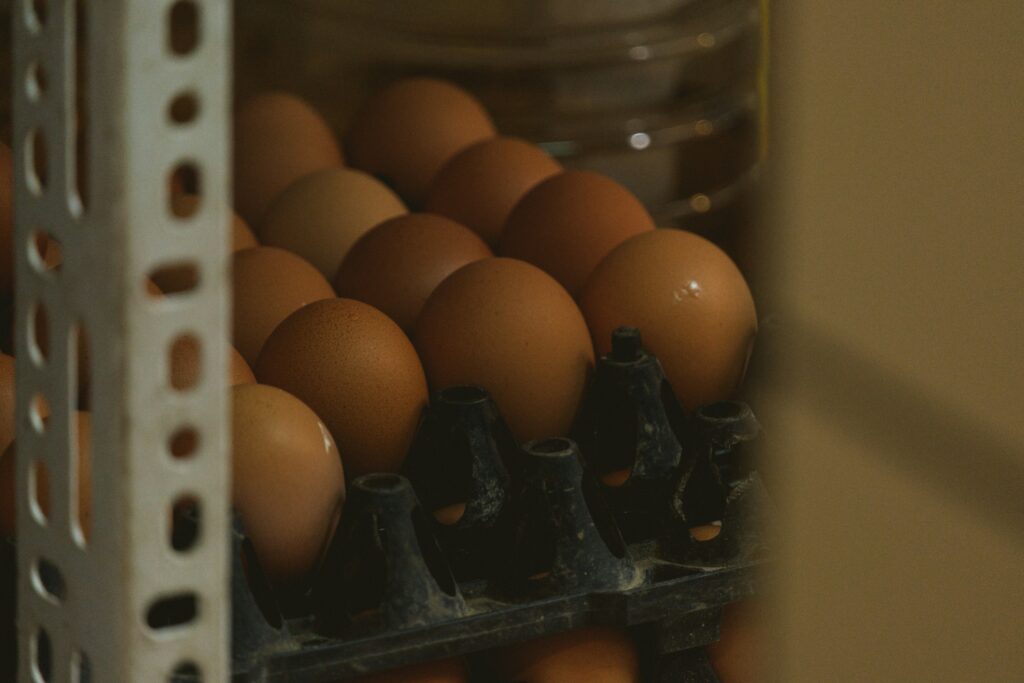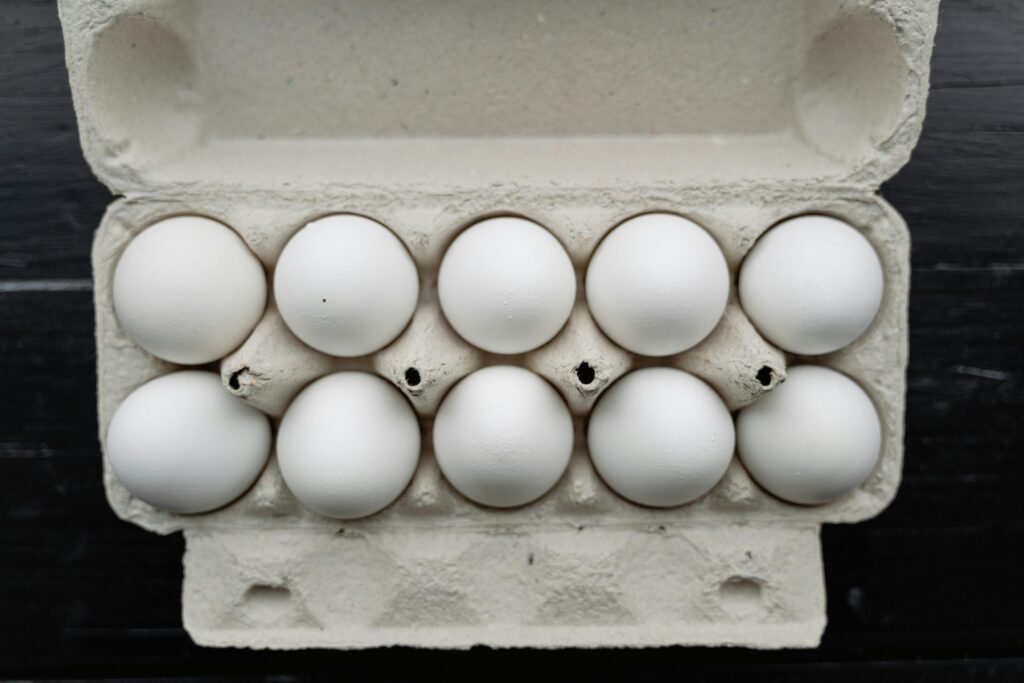Understanding Egg Anatomy and Natural Protection
Fresh eggs come with a unique natural defense: the eggshell. Made mostly of calcium carbonate, the shell isn’t just a barrier—it’s a breathable membrane that allows for gas exchange while keeping bacteria out. But even more important is what coats the shell right after the hen lays it: a nearly invisible, protective film called the “bloom” or cuticle.
This cuticle helps seal the pores on the eggshell, preventing pathogens from entering. It’s nature’s way of keeping the egg fresh before refrigeration ever became standard. However, how long that protection lasts depends on how the egg is handled post-laying.

Photo by Nguyễn Hiệp on Unsplash
The Bloom: Nature’s Protective Barrier
The bloom is a waxy coating deposited naturally by hens, serving as an antimicrobial shield. In countries where eggs are not washed (like much of Europe), this coating is preserved, making unrefrigerated storage safe for several weeks. In fact, fresh unwashed eggs can stay safe at room temperature (around 68°F or 20°C) for up to 21 days, sometimes longer.
Once the bloom is washed off—either commercially or during home cleaning—the egg loses this shield and becomes more susceptible to bacterial infiltration, particularly from salmonella.
Washed vs. Unwashed Eggs: What’s the Difference?
Here’s the key difference:
- Unwashed Eggs (common in backyard farming or countries like France): Can be stored unrefrigerated for up to 2–3 weeks.
- Washed Eggs (common in the U.S.): Must be refrigerated immediately to prevent bacterial growth.
Washing eggs removes the bloom and opens the door to contaminants, especially if the washing process isn’t followed by proper refrigeration.
Why U.S. Eggs Require Refrigeration (and Others Don’t)
In the U.S., FDA regulations require eggs to be washed and sanitized before they reach consumers. While this ensures that visible contaminants are removed, it also strips the bloom, necessitating refrigeration to maintain safety and freshness.
Conversely, in Europe, regulators focus more on maintaining the natural bloom by prohibiting washing for retail eggs. This allows for safe room-temperature storage and reduces condensation risk when moving eggs from cold to warm environments.
USDA Guidelines for Egg Safety
According to the USDA Food Safety and Inspection Service, once eggs are refrigerated, they must remain so. They recommend:
- Storing eggs at 40°F (4°C) or below.
- Discarding any eggs left out more than 2 hours at room temperature.
- Never washing eggs before storing them unless you refrigerate immediately.
This is especially critical for vulnerable populations like the elderly, pregnant women, and young children.

Photo by Polina Tankilevitch
Room Temperature Storage: How Long is Too Long?
If the eggs are unwashed and fresh from the coop, you’re looking at about:
- 2 to 3 weeks unrefrigerated at ~68°F (20°C).
- Possibly longer in cooler environments, like a pantry or cellar around 60°F (15°C).
But if the eggs are store-bought (and washed), they should not be left out for more than 2 hours, especially in warm climates or summer conditions.
Here’s a quick comparison table:
| Egg Type | Washed? | Room Temp Shelf Life | Refrigerated Shelf Life |
| Store-bought | Yes | 2 hours max | 4–5 weeks |
| Backyard (Unwashed) | No | 2–3 weeks | 3+ months |
| Washed Backyard Eggs | Yes | 2 hours max | 4–5 weeks |
How Temperature Affects Egg Freshness
Eggs are surprisingly sensitive to temperature fluctuations. When warm eggs are placed in the fridge, condensation may form—creating moisture that can encourage bacteria. That’s why consistency matters. Ideally:
- Keep eggs at a stable temp.
- Avoid cycling between cold and warm environments.
- Refrigerate eggs as soon as possible if the bloom is removed.
Also, higher ambient temperatures reduce the safe unrefrigerated window. For example, in rooms above 75°F (24°C), eggs may spoil within days—even if unwashed.
Signs an Egg Has Gone Bad
There’s a quick way to test freshness: the float test. Place the egg in a bowl of water:
- Sinks and lays flat = Very fresh
- Sinks but stands upright = Still usable, but not at peak
- Floats = Spoiled—toss it
Other signs include:
- Sour smell when cracked
- Discolored yolk or egg white
- Shell cracks or moldy spots
Best Practices for Storing Eggs Without a Fridge
If you’re keeping unwashed, fresh eggs out of the fridge, here’s how to do it right:
- Keep them in a cool, dry spot—ideally between 55°F and 70°F.
- Store with the pointy end down to preserve the air cell and moisture inside.
- Avoid washing until ready to use.
- Use within 2–3 weeks for optimal freshness.
- Rotate your stock—first in, first out.
- Label collection dates if you gather daily.
- Use ceramic or wire baskets for airflow—not plastic containers.
Countries Where Refrigeration Isn’t Required
Countries like the UK, France, and Germany don’t refrigerate store-bought eggs. That’s due to:
- Lower incidence of salmonella in flocks
- Prohibition of washing and sanitizing retail eggs
- Better consumer education on handling and usage timeframes
In rural or tropical zones, some families use natural refrigeration methods, like clay pots or underground pantries.

Photo by Tima Miroshnichenko
Comparing Farm Fresh vs. Store-Bought Egg Storage
| Feature | Farm Fresh Eggs | Store-Bought Eggs |
| Bloom Present | Yes (if unwashed) | No (washed off) |
| Shelf Life Room Temp | 2–3 weeks | Unsafe beyond 2 hours |
| Refrigeration Required | Optional (if unwashed) | Mandatory |
| Taste | Richer, fresher | Mild |
| Handling | Manual collection & tracking | Standardized packaging |
Farm fresh eggs, when stored right, outperform store-bought in both shelf life and flavor—but only when the bloom is intact.
Storing Backyard Eggs Safely: A Guide for Homesteaders
For homesteaders, preserving egg quality is a balance of natural methods and informed practices:
- Use nesting boxes with clean straw
- Collect eggs twice a day
- Avoid leaving eggs in extreme heat or direct sunlight
- Consider limewater preservation (water-glassing) for long-term storage
Pro tip: In cooler months, unwashed eggs can last even longer, making refrigeration unnecessary for most households.
Egg Storage Charts and Visuals
| Storage Method | Shelf Life |
| Unwashed on Counter | 2–3 weeks |
| Refrigerated (washed or unwashed) | 3–5 weeks |
| Frozen (raw, cracked and stored properly) | 6–12 months |
| Water-glassed in lime solution | 8–12 months |
Eggs can even be frozen (yolks and whites separately) if beaten lightly and stored in airtight containers.
Common Myths About Egg Storage—Busted
- “All eggs need refrigeration” – Only true for washed eggs.
- “A bad egg smells through the shell” – Not always. Crack it to check.
- “Brown eggs last longer than white eggs” – Color has no impact on longevity.
- “Refrigerated eggs can return to room temp” – Doing so may cause sweating and bacteria.
- “Fresh eggs are always better for baking” – Slightly older eggs whip better for meringues.
6 Frequently Asked Questions (FAQs)
1. How long can fresh farm eggs sit out before they go bad?
Fresh, unwashed farm eggs can sit out for 2–3 weeks at room temperature without spoiling.
2. Can I refrigerate eggs after they’ve been sitting out?
Only if they’ve been out for less than 2 hours (if washed). Unwashed eggs can be refrigerated later but condensation may affect quality.
3. How do I know if my eggs are still good?
Try the float test: fresh eggs sink; bad ones float. Always smell the egg once cracked for final confirmation.
4. Is it safe to eat eggs past the expiration date?
Yes, if stored correctly and passing the float and smell test. Expiration dates are conservative.
5. Can you store eggs in the pantry like Europeans?
Yes, but only if the eggs are unwashed and freshly laid with the bloom intact.
6. What’s the best way to store eggs in hot climates?
If no fridge is available, consider clay pot refrigeration or immediate consumption of fresh eggs.

Photo by Gustavo Denuncio
Conclusion: Store Smart, Eat Safe
Fresh eggs, when handled correctly, offer incredible shelf life even without refrigeration. The secret lies in understanding the role of the bloom, knowing the risks of washing, and tailoring your storage practices to the type of egg you’re working with. Whether you’re a homesteader or just curious about food safety, remembering the basics of egg storage can help reduce waste, improve taste, and keep your kitchen safe.
